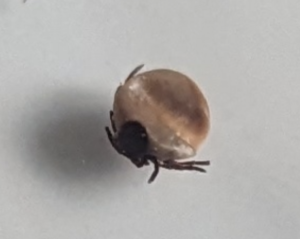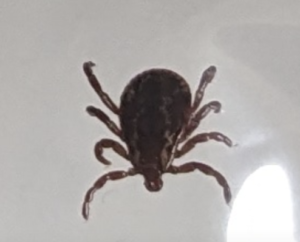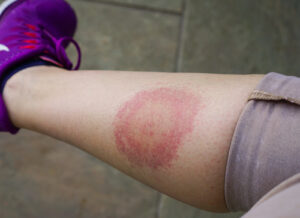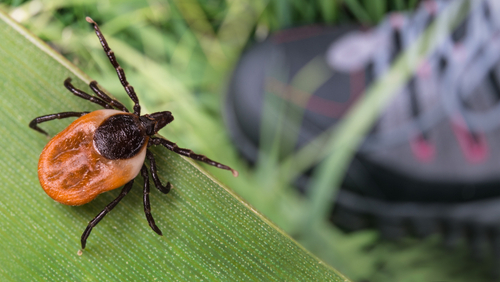Tick Bite Season is Here — What You Need to Know
Betty Chaffee/ May 17, 2024/ Medication Management/ 3 comments
It's early in the tick season, but I've already been bitten. It seems to have happened while gardening several days before I realized it, too. Worse, I didn't know what it was it til I tugged at something I couldn't see, and off came the guy at the right (well, or girl). Knowing that ticks sometimes carry Lyme disease (or other infections), I suspected that my doctor would want to treat with preventative antibiotics. I learned otherwise, and in talking about it with coworkers and friends, it became clear that lots of folks don't know what to expect if they're bitten by a tick. And, since the one at the left found its way into our home two days later (via
days before I realized it, too. Worse, I didn't know what it was it til I tugged at something I couldn't see, and off came the guy at the right (well, or girl). Knowing that ticks sometimes carry Lyme disease (or other infections), I suspected that my doctor would want to treat with preventative antibiotics. I learned otherwise, and in talking about it with coworkers and friends, it became clear that lots of folks don't know what to expect if they're bitten by a tick. And, since the one at the left found its way into our home two days later (via  my husband's mountain biking afternoon), it's clear that ticks are plentiful. So I thought I'd share what I learned with you.
my husband's mountain biking afternoon), it's clear that ticks are plentiful. So I thought I'd share what I learned with you.
What to do if you find a tick on your skin
If it falls off, or is still just crawling around, there's likely nothing to worry about. But if it latched on and started feasting, you'll want to be careful removing it. Here's a video from the CDC with helpful instructions for safely removing a tick from your skin. The idea is to make sure you get the entire insect -- needless to say, since I tugged at mine without knowing what it was, I likely did not get remove it completely. The good news is that our bodies are pretty good at getting rid of things that don't belong, so if you accidentally leave a tick part there it's not likely to cause harm. Your body will find a way to absorb or destroy it.
Be sure to wash the area well and keep it clean as it heals. It's okay to use an antibacterial ointment and cover with a bandage for a day or two, but that's not necessary in most cases. Watch for normal healing. Unless it gets redder, larger, or continues to be uncomfortable, it will likely heal in a few days.
Test the tick?
The Michigan Health Department does offer testing of ticks for identification purposes. They do not test for the presence of infectious disease. According to the Washtenaw County Health Department negative or positive tests for disease aren't reliable in predicting whether a person bitten by the tick becomes ill. So keeping the tick isn't necessary.
Over the next few weeks
 According to public health experts, the only reliable way to know if a tick made you ill, is to find you're becoming ill. A new fever, unusual headache, or generally feeling tired or unwell is a good sign you should call your doctor. The famous bulls-eye rash is also a tell-tale sign of infection. It tends to show up about a week after the initial bite, but can take up to a month to occur. If you develop any of these symptoms, contacting your doctor right away is key. A short course of commonly-used antibiotics is typically effective at treating the infection.
According to public health experts, the only reliable way to know if a tick made you ill, is to find you're becoming ill. A new fever, unusual headache, or generally feeling tired or unwell is a good sign you should call your doctor. The famous bulls-eye rash is also a tell-tale sign of infection. It tends to show up about a week after the initial bite, but can take up to a month to occur. If you develop any of these symptoms, contacting your doctor right away is key. A short course of commonly-used antibiotics is typically effective at treating the infection.
Preventing tick bites
Most of us would rather be outdoors in the spring and summer. But of course, that's where ticks live. So how can we prevent tick bites? Covering the skin with clothing is one good strategy, but may be difficult to do in hot weather. Staying away from densely wooded areas will decrease the risk, but for those who love camping and hiking that may be tough, too. And insecticides can be very effective at keeping those pesky ticks away. Here are some helpful hints about prevention.
Ticks are out there -- keep yourself healthy!
Hopefully this information and the helpful links will come in handy if a tick decides to make a meal of you. Please share your comments and questions below. Or contact us directly at Better My Meds -- we love hearing from you!
Download printable version


Good information and thanks for the link. A question comes to mind. I have to imagine that some people get bitten many times throughout the year. Do you think the body builds up a resistance to the effects after time?
Great question, Tony (as usual!). For sure, those ticks can keep latching on over and over again. They don’t cause infection every time, thankfully, partly because not all ticks carry the bacteria that cause infections, but also because it depends on how long they’re attached. But if you’re wondering if you can get an infection from a bit more than once, the answer seems to be “yes”. There’s no vaccine for tick-borne disease yet. And it seems our bodies don’t learn to fight off tick-borne bacteria the way they learn to fight off some other bacteria and viruses. So, we have to stay vigilant no matter how many times we’ve already been bitten!
Thanks, Betty. I had assumed that ALL ticks would be carriers. The key is to stay healthy to reduce the symptoms of any cooties we are exposed to.